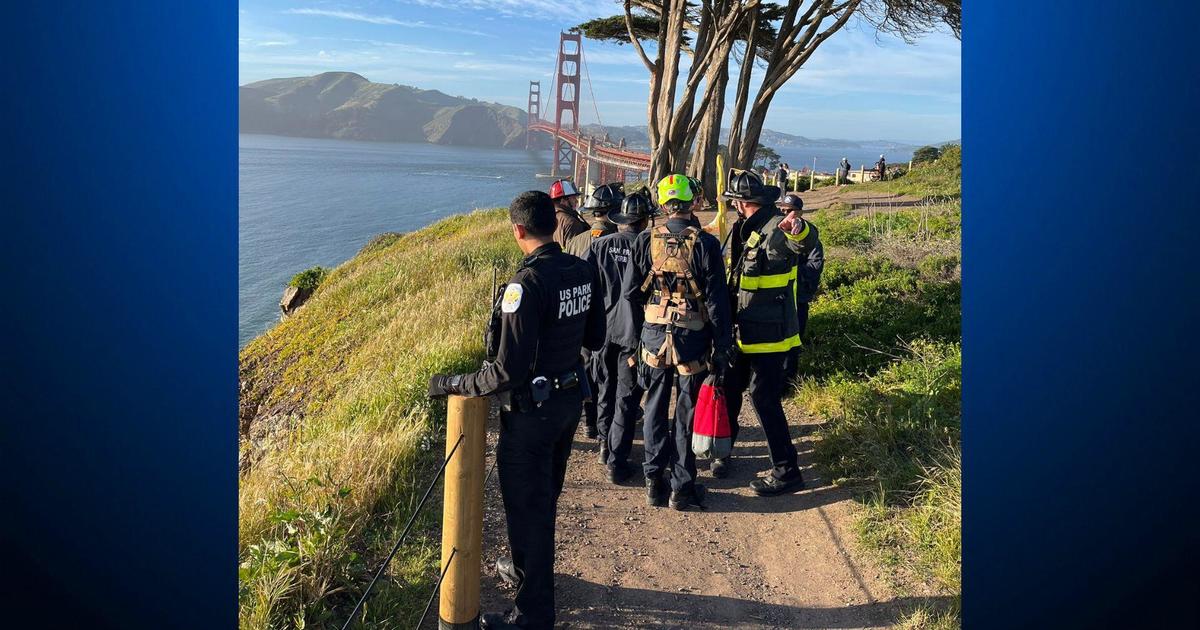COVID-19 Creating A Cancer Crisis As Patients Delay Screenings For Early Detection
SAN FRANCISCO (KPIX) - As California and the Bay Area prepares for a worrisome new outbreak in coronavirus infections and hospitalizations, a second public health crisis has emerged: a massive drop in cancer screenings. More advanced cancers are a result, with fewer options to treat the disease.
That's what happened to Richard Wehmeyer and his family.
In 2019, doctors found a tiny nodule on his lung and urged him to do a follow-up with additional scans in a few months.
"Christmas came, and after Christmas you know the pandemic hit and the whole scare of that," explained Richard's son Nic.
Nic is immunocompromised due to a kidney transplant. When the pandemic hit, the whole family decided to shelter in place together to protect everyone's health. They took reasonable and well-known precautions to minimize any risk of a COVID-19 infection.
"Having another screening, talking with doctors, all that kind of took a back seat because of the pandemic," said Nic.
In August, Richard coughed up blood and thought he had COVID-19.
At the hospital, doctors discovered stage 4 lung cancer. At that point, there were few options besides an aggressive approach. Richard died about a month after beginning treatment.
"I think because of that delay, because of the fear, because of the unknown," remarked his son.
It's not just lung cancers.
"Several patients that I can think of who have had this same scenario play out which is very, very concerning," explained Dr. Ankit Sarin, a colorectal surgeon at the University of California, San Francisco Medical Center (UCSF).
He told KPIX 5 because of the pandemic; patients have put off screenings at a terrible cost. When colorectal cancer is caught in its earliest manifestation as a polyp, it is curable.
"These cancers that would have otherwise been very, very manageable and curable, go on to become you know metastatic, non-curable, and even fatal," said Dr. Sarin.
During the Spring, COVID-19 shut down much of nation's health care system, halting elective surgeries, closing clinics and sending patients to shelter-in-place. Now, a massive data crunch reveals a disturbing trend.
"Let me look at your California numbers here, that we sent you," said medical doctor Deneen Vojta during a remote interview, as she reviewed the statistics sent to KPIX 5.
Dr. Vojta is Executive Vice-President of Research and Development for UnitedHealth Group, the largest health care company in the world.
Her team scours medical claims for early signs of any brewing trouble, to prevent or intercept disease.
They crunched California claims data for KPIX 5 and detected the alarming trend with cancer screenings and diagnoses that occurred during the first eight months of 2020.
"Sure, enough they are seeing patients at later stages," noted Dr. Vojta.
In the first eight months of 2020, cancer screenings for breast, colorectal, and cervical cancers in California plummeted.
By the second week of April, mammograms and colorectal cancer screenings in people with no symptoms dropped more than 90 percent.
No screening meant less opportunity for an early diagnosis or to catch the cancer in an earlier stage.
In fact, claims submitted for breast, colorectal and cervical cancer diagnoses actually dropped by about 50 percent.
It's important to note these screenings were for individuals who are not already at an increased risk.
"Because these are asymptomatic people we don't know if and when that will rear its ugly head as it relates to more cancers and more advanced cancers," remarked Dr. Vojta.
"As a treating physician, having to treat women with advanced breast cancer breaks my heart," said medical doctor Eileen Consorti.
Dr. Consorti is a breast cancer survivor and specialist with Sutter Health. She is the director of the Carol Ann Reed Breast Care Center at Alta Bates Summit Medical Center, in Oakland.
She told KPIX 5 there are so many more treatment options available to women who are diagnosed with earlier stage disease.
"If we can get those women in for early detection, I would be thrilled," remarked Dr. Consorti.
As for why the drop in routine cancer screenings, the reasons are complex, but the confluence of events ignited it.
"COVID has created a perfect storm," said Dr. William Cance.
Dr. Cance is Chief Medical and Scientific Officer for the American Cancer Society. He told KPIX 5 that not only were people scared of COVID, an estimated 12 million lost their health insurance along with their jobs.
"Sadly, it gets to the point of 'Am I going to pay my rent this month or am I going to get a colonoscopy,'" explained Dr. Cance.
Even so, public health experts and medical specialists remind patients that going to a health clinic or hospital is safer than shopping at a grocery store or dining indoors at a restaurant.
"Cancer you know doesn't shelter in place," said medical doctor David Jablons.
Dr. Jablons is a professor and Chief of Thoracic Surgery at UCSF. He leads the thoracic oncology program at the medical center and operates on lung cancers.
Lung cancer is the dominant cancer killer worldwide. At UCSF, they have developed screening initiatives to find early-stage lung cancers.
Dr. Jablons noted that with COVID-19, the tragedy is that many patients are not coming in for screenings.
"They are afraid to come into hospitals. They are afraid to go into clinics. They are afraid to go to radiology suites," said the lung specialist.
He said if patients wait for any cancer screening, then many tens of thousands of patients will miss the chance for a curative early-stage diagnosis. With lung cancer, the earlier the diagnosis, the more options for treatment are available to the patient and their family.
"The vast majority of patients with a small nodule that we can take out with minimally invasive techniques, using robotic techniques and people are in and out of the hospital in a day," he added.
Dr. Jablons explained lung cancers are the poster child for high tech treatment. They benefit from precision or targeted therapies: special treatments that may target the mutation causing the disease, and turn it off, effectively resulting in shutting down the cancers in an advanced stage setting or even exploding those in earlier stages.
But these benefits begin with effective screenings.
"I'm just saying that screening is definitely, absolutely the most important first step," stressed Dr. Jablons.
He told KPIX 5 since this pandemic is not going away anytime soon, patients should not socially distance themselves from a routine cancer screening.
"We can't just grind everything to a halt and be paralyzed by fear," said the UCSF lung expert.
Self-taught software engineer Charlie Harrington did not delay. Early September, he noticed strange symptoms, and went in to see his doctor.
A screening revealed colon cancer. A promptly scheduled surgery revealed an earlier stage disease that was treatable.
"I was paying attention to the symptoms that led me to go in and ask questions, which led to the colonoscopy, which led to the surgery, which then caught my cancer before it spread," explained Harrington.
He underwent surgery at UCSF and said the experience was actually very safe.
"I had to do multiple COVID tests and that gave me the confidence to know that this was the right move for me to make," Harrington noted. He actually blogged about his experience with colorectal cancer, using humor to get his point and knowledge across to others.
"My wife and I always talk about staying light and buoyant. I tried to reflect that in the writing; There's a lot of stuff for young people when it relates to their health," explained the young man.
As for Nic, even though he has a comprised immune system, he is keeping up with his regular checkups. He's lost his dad during this pandemic, but he doesn't intend to lose anything else.
"For me, it's about making smart choices, doing the things I know I need to do for my health, and being brave," said Nic.
The number of cancer screenings has gone back up but not enough to make up for all the missed ones earlier this year.
UnitedHealth Group is starting a pilot program to address the issue. The group is sending out home testing kits for colon cancer to 15,000 enrollees. The hope: as this pandemic wears on, that fewer earliest stage colon cancers won't be missed.



